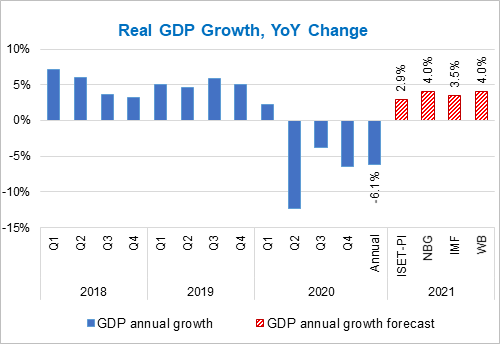The COVID-19 outbreak had a devastating effect on the Georgian economy in 2020. Real GDP contracted by 6.1% according to Geostat’s rapid estimates of economic growth. This was the worst performance of real GDP growth in the country in more than two decades. According to the latest estimates, the economic reality turned out to be far worse than the mid-year projections from NBG, IMF and the World Bank for 2020, which ranged from -4% to -5% y/y. Unemployment increased by 0.9% y/y, while labor force participation decreased by 1.3% y/y in 2020. Hired employees were among those worst affected by the crisis: their number decreased by 5.8% y/y. The unprecedented simultaneous negative demand and supply shocks were at the heart of the economic devastation caused by the virus. Uncertainties related to the pandemic itself and containment measures against it considerably reduced aggregate demand both in Georgia and globally. Domestic and external demand for tourism and related services weakened significantly.
As a result, the current account deficit widened even as imports declined. The deficit, driven by lower revenues from the export of services and curtailed foreign direct investments (FDI), put significant devaluation pressure on the lari exchange rate throughout the year. In addition to demand pressures, pandemic-related constraints distorted global and regional supply chains and increased production costs. This, in turn, negatively affected aggregate supply. On the positive side, the economic impact of COVID-19 in Georgia could have been much deeper if it were not for strong fiscal stimulus, substantial bank lending, and better-than-expected remittances performance. These three factors helped mitigate the economic fallout from the epidemic in 2020.
More Macro Review Articles
-
Quarter 1 2021, Macro Review | The Georgian economy – a long and uncertain road to recovery
 The World Bank (June 2021) estimates that global GDP growth will reach 5.6% year over year (y/y) in 2021. Though thus rebound is uneven, with growth concentrated mainly in advanced economies and developing countries set for a slower recovery. This is driven by unequal access to vaccines, different paces lifting virus containment restrictions, and the scale of fiscal support to the economy. This year the United States and Euro area are projected to expand by… Read More
The World Bank (June 2021) estimates that global GDP growth will reach 5.6% year over year (y/y) in 2021. Though thus rebound is uneven, with growth concentrated mainly in advanced economies and developing countries set for a slower recovery. This is driven by unequal access to vaccines, different paces lifting virus containment restrictions, and the scale of fiscal support to the economy. This year the United States and Euro area are projected to expand by… Read More
-
Quarter 4 2020, Macro Review | The 2020 Georgian economy – the year in review
 The COVID-19 outbreak had a devastating effect on the Georgian economy in 2020. Real GDP contracted by 6.1% according to Geostat’s rapid estimates of economic growth. This was the worst performance of real GDP growth in the country in more than two decades. According to the latest estimates, the economic reality turned out to be far worse than the mid-year projections from NBG, IMF and the World Bank for 2020, which ranged from -4% to… Read More
The COVID-19 outbreak had a devastating effect on the Georgian economy in 2020. Real GDP contracted by 6.1% according to Geostat’s rapid estimates of economic growth. This was the worst performance of real GDP growth in the country in more than two decades. According to the latest estimates, the economic reality turned out to be far worse than the mid-year projections from NBG, IMF and the World Bank for 2020, which ranged from -4% to… Read More
-
Quarter 3 2020, Macro Review | Georgia’s Q3 economic blues reflect the realities of the global supply and demand double shock
 According to the preliminary statistics released by GeoStat, Georgia’s real GDP contracted by 3.8% year over year (y/y) in Q3 2020. As a result, the estimated real GDP declined by 5.0% in the first nine months of 2020, which is in line with the International Monetary Fund’s (IMF) and National Bank of Georgia’s (NBG) latest projections of -5% y/y (from October and November correspondingly). Meanwhile, based on October’s data, ISET-PI expects lower GDP contraction in 2020, as the forecast stood… Read More
According to the preliminary statistics released by GeoStat, Georgia’s real GDP contracted by 3.8% year over year (y/y) in Q3 2020. As a result, the estimated real GDP declined by 5.0% in the first nine months of 2020, which is in line with the International Monetary Fund’s (IMF) and National Bank of Georgia’s (NBG) latest projections of -5% y/y (from October and November correspondingly). Meanwhile, based on October’s data, ISET-PI expects lower GDP contraction in 2020, as the forecast stood… Read More
- 1
- 2
- 3
- 4











